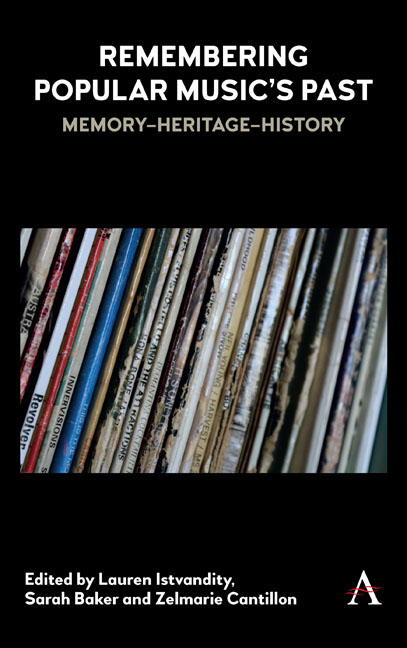Book contents
- Frontmatter
- Contents
- List of Figures
- Acknowledgements
- Chapter 1 The Precarity of Memory, Heritage and History in Remembering Popular Music's Past
- Part I MEMORY
- Part II HERITAGE
- Part III HISTORY
- Chapter 12 Jim Jarmusch's Mystery Train (1989): Representing the Memphis Music Legacy on Film
- Chapter 13 Phenomenology of the Surf Ballroom's Winter Dance Party: Affect and Community at a Popular Music Heritage Tourism Event
- Chapter 14 Disappearing History: Two Case Studies on the Precarity of Music Writing
- Chapter 15 Great Albums, Greedy Collectors and Gritty Sounds? A View from ‘Snobbish Connoisseurs’ on the Canonization and Archivalism of Korean Pop-Rock
- Chapter 16 Towards a Feminist History of Popular Music: Re-examining Writing on Musicians and Domestic Violence in the Wake of #MeToo
- List of Contributors
- Index
Chapter 15 - Great Albums, Greedy Collectors and Gritty Sounds? A View from ‘Snobbish Connoisseurs’ on the Canonization and Archivalism of Korean Pop-Rock
from Part III - HISTORY
Published online by Cambridge University Press: 09 July 2019
- Frontmatter
- Contents
- List of Figures
- Acknowledgements
- Chapter 1 The Precarity of Memory, Heritage and History in Remembering Popular Music's Past
- Part I MEMORY
- Part II HERITAGE
- Part III HISTORY
- Chapter 12 Jim Jarmusch's Mystery Train (1989): Representing the Memphis Music Legacy on Film
- Chapter 13 Phenomenology of the Surf Ballroom's Winter Dance Party: Affect and Community at a Popular Music Heritage Tourism Event
- Chapter 14 Disappearing History: Two Case Studies on the Precarity of Music Writing
- Chapter 15 Great Albums, Greedy Collectors and Gritty Sounds? A View from ‘Snobbish Connoisseurs’ on the Canonization and Archivalism of Korean Pop-Rock
- Chapter 16 Towards a Feminist History of Popular Music: Re-examining Writing on Musicians and Domestic Violence in the Wake of #MeToo
- List of Contributors
- Index
Summary
In April 2016, a musical event titled ‘Pops Asiana DJ Party’ was held at Seoul's Kopch'angjŏn'gol, a pub known for its gritty and funky atmosphere. Four different DJs played a great variety of Asian popular music from different parts of the continent. ‘The Sound of Seoul’, ‘South China Sea Ferry’, ‘Pakistani Express’ and ‘Mekong River Date’ were the titles of the sets. The names of countries or cities in the sets did not necessarily represent nationalities of DJs who played them, as a Korean DJ played Pakistani pop, while a Japanese DJ played Chinese. However, the real surprise was the music. No one played J-pop or K-pop, arguably the most exemplary genres in Asian pop. Instead, the repertoires consisted of what could be categorized as vintage music from obscure vinyl records released more than half a century ago. To the shame of one of this chapter's authors (Hyunjoon Shin) as an expert in Asian pop, he was unable to recognize a single song except, obviously, Korean ones. All he could do was to guess the country and era in which each song came out. To his relief, he was not the only one at the party who was bewildered by the succession of never-heard songs. Even the music identification app Shazam failed to suggest any results.
What is interesting about the Pops Asiana event is that the crowds were mostly informed young music fans. Some of them were expatriates from North America and Europe, one of the key agents in hip, non-mainstream, connoisseur culture in the Korean context. Thus, it is far from the case that the event was for nostalgia even though the music was very old. Nor is it a case of retromania (Reynolds 2011) since not a single song can be classified as a classic or part of a canon. Pops Asiana is an entirely unknown territory even for Asians.
- Type
- Chapter
- Information
- Remembering Popular Music's PastMemory-Heritage-History, pp. 203 - 216Publisher: Anthem PressPrint publication year: 2019

